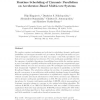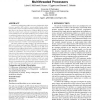280 search results - page 5 / 56 » A methodology for evaluating runtime support in network proc... |
JUCS
2008
13 years 7 months ago
2008
: Multi-Agent Systems (MAS) constitute a well known approach in modelling dynamical real world systems. Recently, this technology has been applied to Wireless Communication Systems...
JSSPP
2000
Springer
13 years 10 months ago
2000
Springer
Abstract. Buffered coscheduling is a new methodology that can substantially increase resource utilization, improve response time, and simplify the development of the run-time suppo...
PC
2007
13 years 6 months ago
2007
We explore runtime mechanisms and policies for scheduling dynamic multi-grain parallelism on heterogeneous multi-core processors. Heterogeneous multi-core processors integrate con...
PPOPP
2003
ACM
14 years 9 days ago
2003
ACM
Simultaneous multithreading (SMT) represents a fundamental shift in processor capability. SMT's ability to execute multiple threads simultaneously within a single CPU offers ...
ISPAN
2005
IEEE
14 years 19 days ago
2005
IEEE
The amount of Task Level Parallelism (TLP) in runtime workload is useful information to determine the efficient usage of multiprocessors. This paper presents mechanisms to dynami...


